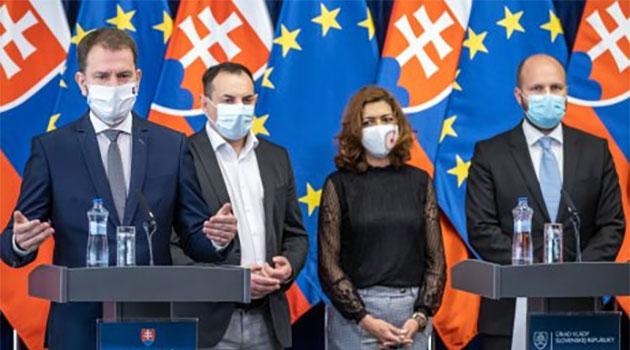Slovak Govt Plenipotentiary for Roma tells ROMEA TV there are no plans for the Army and police to "invade" Romani settlements
Romani settlements in Slovakia are also being affected by measures taken to combat the COVID-19 pandemic. Today testing of residents begins in 33 selected communities where Romani community members live.
“There are no plans for any ‘invasion’ by the police and Army,” the Slovak Government Plenipotentiary for Romani Communities Andrea Bučková said yesterday in an exclusive interview for ROMEA TV in which she explains how the entire testing effort will take place. “This is not about testing en masse, this is just about testing those people who have a so-called itinerary of travel, which means they have returned to Slovakia from abroad during the last 14 days and that fact has been recorded,” she said, further clarifying some of the imprecise descriptions that have appeared in the media by explaining that thanks to a project called “Healthy Regions”, the Government has currently begun tracing the travel itineraries of all returning to the country and that cases of families who have returned from abroad have begun to be recorded.
“As we said at the press conference, there are currently about 1 590 families for whom a travel itinerary has been recorded, and on the basis of that information, 33 communities have been selected where mobile units will be used for the testing,” she told ROMEA TV. “These will not be the so-called ‘fast tests’, but Army experts in civilian protection will be performing the tests using swabs and the results should be known within two days.”
If somebody in the settlements tests positive for COVID-19, the Plenipotentiary said the same approach will be taken toward that person as would be taken toward anybody else in Slovakia. “That means the results are delivered to the Public Health Authority for that region and the people will be relocated to health care facilities,” she explained, adding that just as in cases of others who test positive, the authorities will then ask the people to provide information about who they have been in contact with and who else they could have infected.
As far as quarantine measures go, it is necessary, according to the Plenipotentiary, to take into account certain specific characteristics of the excluded localities where Romani people live. “As a general rule, such localities are separated spatially from the majority population, this is a rather big social area, families have been connected there for generations and all of that must be kept in mind,” she said.
According to Bučková, there can exist different degrees of a feeling of danger with respect to the pandemic, each person can be affected by the atmosphere of his or her environment, and naturally the degree to which people are informed about COVID-19 influences their sense of risk, which is very individual. She reminded viewers that many members of the helping professions already work in these localities, from health care assistants to field workers, community workers, and civic patrols.
Bučková would not rule out that some communities that have been quarantined could even be closed down. “It’s not just me, though, all the rest of us who are involved also genuinely have the ambition to minimize any circumstances that would require the armed forces,” she assured viewers.
“I am not saying that a police presence is absolutely ruled out, but this is genuinely about the health of all of us, this is not about a demonstration of force,” she explained. “The first line of contact with the inhabitants of these communities will be staffers from the helping professions who are in daily contact with these people already.”
According to the Plenipotentiary, the people in charge of the testing are very sensitive and have reviewed in detail with Romani experts how the testing itself will be carried out. “Yesterday we went through it all in great detail, the meeting lasted more than four hours, then there was a break and it resumed. It decidedly will not be undertaken in such a way that the Army would arrive in a locality in an insensitive way and make a show of force, or tape off these places so that the people will be even more separated from the rest of society, that is not at all the aim,” she said.
